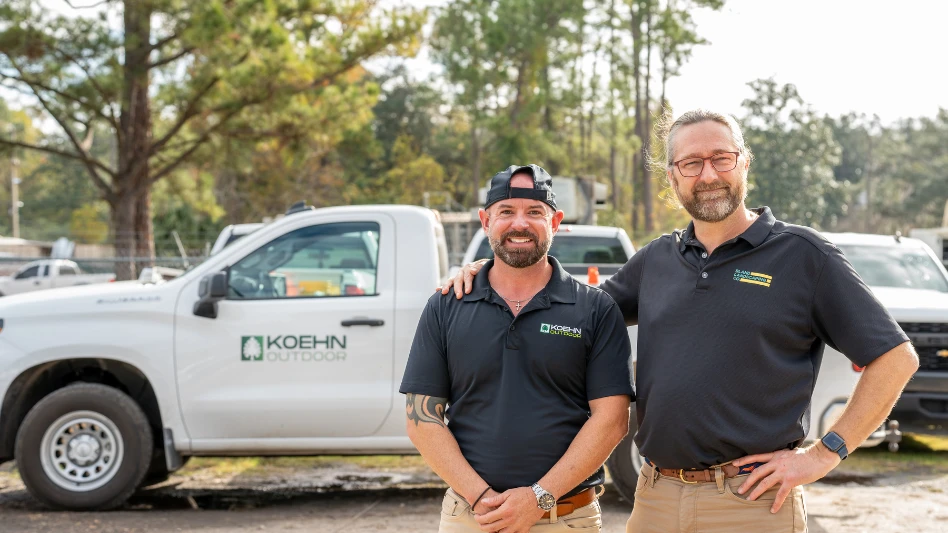 ROB JOHNSON
ROB JOHNSON
As 2009 draws to a close, many contractors are happy to see it go. December 31 will mark the end of one of the worst years – and economies – the green industry has faced. Many companies saw revenues plunge and, as a result, were forced to lay off employees and retool their business models.
January 1 starts a new year, and for many companies, a fresh start. Lawn & Landscape magazine talked to contractors to see how they are recalibrating their companies to prepare for the new year, what new services they plan to offer customers and the programs they put in place to make sure next year is a lot better than this year.
One has turned to government projects and green services to bolster a drop in the residential design/build market. Another took his company’s talent in residential maintenance and put it to work for large, industrial clients – which now make up half of his revenue. And a third formed a new company with a local maintenance firm – after getting out of the grass cutting business for more than a decade – to become a full-service partner for its customers.
Government Work
Chackbay Nursery & Landscaping found its success primarily in the residential design-build market. But when that segment dropped off about 20 percent when the economy tanked, owner Benton Foret knew he had to do something different. So he tweaked his approach, and started bidding government-funded design/build projects.
“It doesn’t cost us anything to tool up to do this – we have the know-how and personnel and equipment. We’re just trying to look at other areas where we can utilize our talent and personnel and equipment,” Foret says. “It’s where we see opportunity for our company.”
Based in Thibidaux, La., an hour and a half outside of New Orleans and Baton Rouge, Chackbay employs 55 in maintenance and construction divisions. Last year, the company pulled in $2.8 million. “We have a good reputation for high-end design/build. This is more of a future decision for how this company can develop,” Foret says of the move to municipal projects. “It’s by no means a reactionary decision … it’s a hedge against other areas dropping off.”
 A new BP facility had Chackbay Nursery & Landscaping renovating wetlands. Photo: Chackbay Nursery & LandscapingOne, the Acadia Plantation in Thibidaux, required the usual sod and trees, but also the installation of sidewalks, a fountain, retaining walls and a drainage system. And the BP Houma Operations Learning Center in Schriever, La., had his company doing a lot of planting, but also renovating a wetland into a newer water feature.
A new BP facility had Chackbay Nursery & Landscaping renovating wetlands. Photo: Chackbay Nursery & LandscapingOne, the Acadia Plantation in Thibidaux, required the usual sod and trees, but also the installation of sidewalks, a fountain, retaining walls and a drainage system. And the BP Houma Operations Learning Center in Schriever, La., had his company doing a lot of planting, but also renovating a wetland into a newer water feature.
Foret has partnered with a local civil contractor and applied to become a state-licensed building contractor. This will allow him to do installations that also may require building structures.
He sees a niche for Chackbay in the middle ground: projects that are too large for his competition in landscape contractors, but too small for the state’s large general contractors. These civil projects will make up about 10-15 percent of the company’s revenue, and Foret says he’d like to see that figure closer to 25 percent.
“We just to have a little more competitive edge on larger general contractors just due to the size of our company. Just because we’re a small company doesn’t mean we aren’t able to do these projects,” he says.
Foret has also started to work on LEED-certified projects – rooftop gardens, storm water irrigation, green screening and solar panel installation – which often overlap with municipal work. “Contractors are calling us saying they don’t know how to do it,” he says. “That, to me, is promising for us. Because no one else in this area is going to specialize in that.”
Industrial Expertise
For 14 years, Brunswick, Ga.-based Coastal Greenery has focused on residential maintenance. But 2009 forced Jeffrey Johns and his $2.1 million company to look at adjusting their core business. Johns turned to industrial maintenance – taking care of the turf at industrial office parks, chemical plants and government training facilities. He started the service in mid-2009, and won his biggest contract to date – a 350-acre chemical plant – in November.
“We’re trying to get a niche into that market. We’re seeing it as a great opportunity for us this coming year,” he says, adding the new service builds on something his company already did well. “We cut grass. We cut grass very well. A lot of these people need that service.”
 Johns’ region, about 50 miles north Jacksonville, Fla., in coastal Georgia, is replete with second homes, and those customers are cutting back.
Johns’ region, about 50 miles north Jacksonville, Fla., in coastal Georgia, is replete with second homes, and those customers are cutting back.
In 2008, residential accounts made up 80 percent of Johns’ business; this year, that figure was 40 percent. In the next five years, he says 60 to 70 percent of revenue will come from commercial accounts and the rest will come from industrial business.
“We’re looking to slowly dwindle away from residential arena all together. As a business owner, we’ve kind of outgrown that residential arena. It’s not really fitting in with our niche any more,” Johns says. “I just didn’t feel that the residential market fit me. I personally didn’t feel comfortable. It just didn’t fit.”
The new niche means new equipment and new systems for his crews. At these facilities, a crew supervisor must stay with each team at all times. And he Johns is able to keep a lot of his equipment on site, which saves fuel costs. He had to buy bigger machines – $85,000 all told for a new industrial tractor, four new mowers with extra-wide mowing decks and utility vehicles to get around the huge campuses.
It also means steadier work that’s easier to manage: Most of the contracts he’s signed are for three to five years, and he can get higher revenue from a smaller client base. He’s cut his residential contracts from 247 to 176. His 35 industrial customers bring in the same revenue as those 176 residential ones.
“Are you going to work for 247 customers or are you going to work for 176?” he asks.
Keeping Control
Chris DiSabatino got out of maintenance more than a decade ago. He couldn’t make any money doing it, and cut the service from his offerings.
DiSabatino Landscaping and Tree Service in Wilmington, Del., does 98 percent residential work, has 45 employees and brought in $5 million last year. They do design/build work, weeding and clean-ups, but not the weekly mowing. That left a window for DiSabatino’s competition to get their truck on his customers’ grass. He wanted to reinforce the idea that his company could take care of all their needs and strengthen their relationship.
“We wanted to make sure we’re the only provider on their property,” he says. “It gives an opening for the competition, but you’re also losing control of that property if you’re not out there (all the time).”
Now, 11 years later, DiSabatino decided to dive back in. But this time, he’s formed a partnership with a smaller, strictly maintenance and irrigation company to provide the service to his 7,000 customers.
The set up is different than a subcontractor because DiSabatino formed an entirely new company to handle the maintenance. This allows him to more closely control the brand and image of the people taking care of his customers, and he still doesn’t incur a lot of extra overhead cost.
“After this latest, big recession, the whole reason why we’re still going to be a strong company is our existing clients,” he says of the motivation to move to a full service model. “My core clients were the success and the foundation of our business. You need to give thanks by taking care of your existing clientele. They’re the whole reason we’re in business, and the reason our company’s going to be a stronger company.”
The author is associate editor of Lawn & Landscape magazine. Send your new service ideas to him at cbowen@gie.net.

Explore the December 2009 Issue
Check out more from this issue and find your next story to read.
Latest from Lawn & Landscape
- Analysis of an entrepreneur
- Terra Nova's Sedum Conga Line variety wins Best of 2024 Perennial award
- Different ways to distribute
- Case's 580EV electric backhoe loader wins Good Design Award
- Davey Tree promotes Dan Herms to VP, GM of Davey Institute
- Caterpillar's Cheryl H. Johnson set for April retirement
- Registration open for sixth annual Lawn & Landscape Technology Conference
- 12 interview questions to help you hire winners





